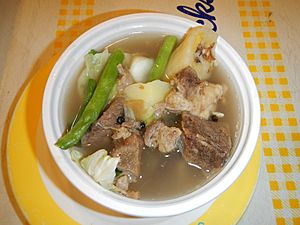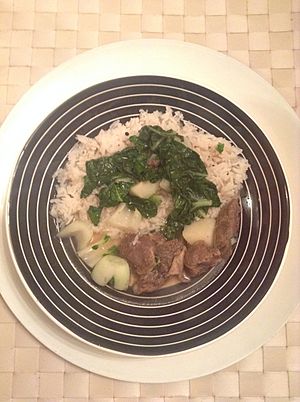Nilaga facts for kids

|
|
| Type | Stew/Soup |
|---|---|
| Place of origin | Philippines |
| Similar dishes | Bulalo, Lauya, Cansi |
Nilaga (also spelled nilagà) is a delicious and simple soup or stew from the Philippines. It's made by boiling beef (called nilagang baka) or pork (called nilagang baboy). Lots of healthy vegetables are added too!
People usually eat Nilaga with white rice. You can also add soy sauce, fish sauce (called patis), spicy chilis, and calamansi (a small lime) to make it taste even better.
What is Nilaga?
Nilaga is one of the easiest dishes to make in the Philippines. It often uses soft and tasty cuts of meat. These can be sirloin, pork belly, ribs, or brisket.
The meat is boiled until it's super tender. Then, it's flavored with different ingredients. These include onions, garlic, salt, and whole black peppercorns. Sometimes, scallions, fish sauce, lemongrass, ginger, or bay leaves are added. The soup often gets extra flavor from bouillon cubes.
Vegetables in Nilaga
Many different vegetables can be put into Nilaga. The most common ones are pechay (or cabbage) and potatoes.
Other vegetables you might find are:
- Carrots
- Saba bananas (a type of cooking banana)
- Calabaza (a type of squash)
- String beans
- Tomatoes
- Celery
- Broccoli
- Cauliflower
- Chayote
- Corn on the cob
- Baby corn
- Bell peppers
- Sweet potatoes
Nilaga can be eaten by itself, but it's usually enjoyed with white rice. You can add soy sauce, fish sauce, chilis, and calamansi to your bowl. This lets you make it taste just right for you!
Similar Filipino Soups
Nilaga is like some other Filipino soups, but it has its own special features. For example, chicken or seafood versions are usually called tinola.
Nilaga is also very similar to dishes like bulalo, linat-an, lauya, and cansi. Sometimes, people even think of them as types of Nilaga.
How Nilaga is Different
Nilaga is special because it has a broth base. This broth is made from tender, meaty, and fatty cuts of beef or pork.
Other similar dishes, like bulalo, have a stock base. This stock is made using bone marrow and parts of beef and pork that are rich in collagen. Examples include beef shank and ham hocks.
The word "Nilaga" means "boiled" in the Tagalog language. This word is also used for other simple boiled foods. These can be boiled peanuts, corn on the cob, or saba bananas.
 | John T. Biggers |
 | Thomas Blackshear |
 | Mark Bradford |
 | Beverly Buchanan |


